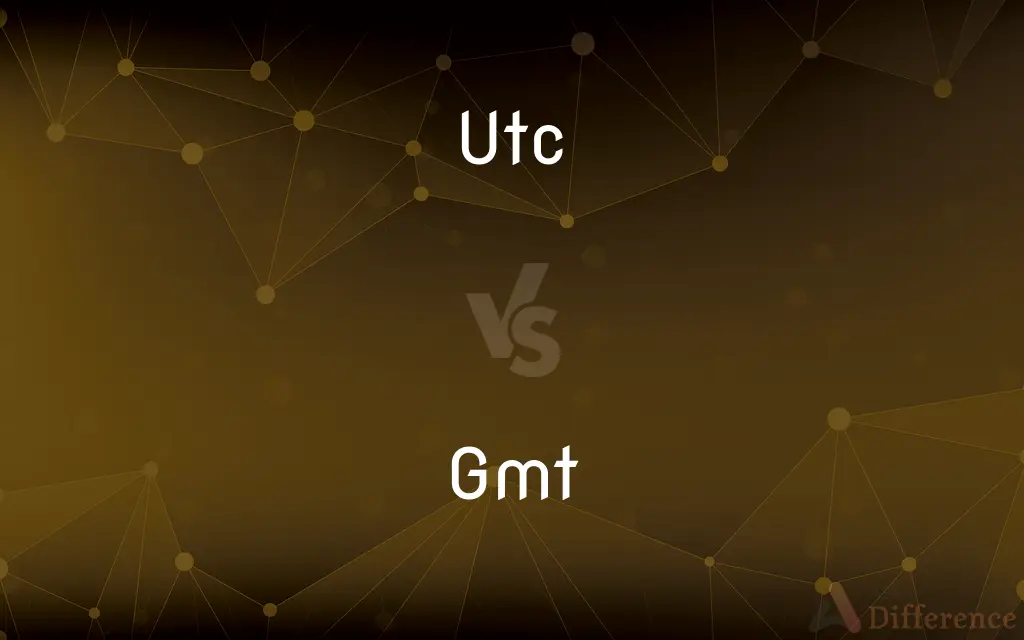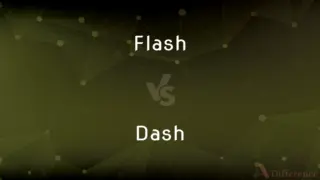UTC vs. GMT — What's the Difference?
By Tayyaba Rehman — Updated on September 21, 2023
UTC is the coordinated universal time, determined by atomic clocks. GMT, or Greenwich Mean Time, is based on Earth's rotation and was once the standard. Both represent the same time zone but differ in derivation.

Difference Between UTC and GMT
Table of Contents
ADVERTISEMENT
Key Differences
UTC, standing for Coordinated Universal Time, is the time standard determined by highly precise atomic clocks combined with Earth's rotation. GMT, or Greenwich Mean Time, predates UTC and is determined based on the mean solar time at the Royal Observatory in Greenwich, London.
Many people use UTC and GMT interchangeably, as they represent the same time zone. However, the distinction lies in their methods of calculation. While UTC employs atomic time with adjustments for Earth's rotation, GMT is solely reliant on the Earth's rotation.
GMT was historically the world's time standard, used widely for navigational purposes due to its connection with the Prime Meridian (0° longitude). Over time, as technology advanced, UTC emerged with its atomic clock accuracy, surpassing GMT in precision and reliability.
Today, UTC is the foundation for civil time, setting the pace for time zones around the world. GMT, though still in use, mostly serves as a time zone reference rather than a time standard. The drift between GMT and UTC can be a few milliseconds due to Earth's irregular rotation.
It's essential to note that, for most practical purposes, UTC and GMT yield the same time. Nevertheless, when high precision is needed, like in satellite communication and navigation, UTC is the go-to standard due to its unparalleled accuracy.
ADVERTISEMENT
Comparison Chart
Definition
Coordinated Universal Time.
Greenwich Mean Time.
Calculation
Based on atomic clocks and adjusted with Earth's rotation.
Based on mean solar time at the Royal Observatory in Greenwich.
Usage
Modern time standard for the world.
Former time standard, now primarily a time zone.
Precision
Extremely precise due to atomic timekeeping.
Less precise; based solely on Earth's rotation.
Adjustments
Leap seconds are added or subtracted to account for Earth's rotation irregularities.
No such adjustments.
Compare with Definitions
Utc
Uses leap seconds to align with Earth's rotation.
Occasionally, a leap second is added to UTC to compensate for Earth's slowing rotation.
Gmt
Precursor to UTC as the world's time standard.
Before atomic clocks, GMT set the standard for international time.
Utc
An updated replacement for GMT with higher precision.
Satellite systems use UTC because of its precise nature.
Gmt
Time based on the mean solar time at Greenwich.
GMT was formerly used by sailors for navigation.
Utc
Time standard based on atomic clocks.
The global financial systems often rely on UTC for timestamping transactions.
Gmt
Represents the time zone of the Prime Meridian.
London is typically on GMT during the winter months.
Utc
The foundation for current civil time worldwide.
All world time zones are defined by their difference from UTC.
Gmt
Greenwich Mean Time, historically significant.
The Royal Observatory in Greenwich used to determine GMT based on solar observations.
Utc
Abbreviation for Coordinated Universal Time.
UTC is the preferred standard for aviation and navigation.
Gmt
Does not account for leap seconds.
GMT remains consistent without adjustments like leap seconds in UTC.
Utc
Greenwich Mean Time updated with leap seconds
Gmt
The local time at the 0 meridian passing through Greenwich, England; it is the same everywhere
Common Curiosities
Why did the world shift from GMT to UTC?
The advent of atomic clocks made UTC more precise than GMT.
Why is GMT associated with Greenwich, London?
GMT is based on the mean solar time at the Royal Observatory in Greenwich.
Are UTC and GMT the same thing?
They represent the same time zone, but their methods of determination differ.
How is UTC determined?
UTC is based on atomic time and adjusted for Earth's rotational variations.
Which is more accurate, UTC or GMT?
UTC is more accurate due to its reliance on atomic clocks.
Do both UTC and GMT account for leap seconds?
Only UTC accounts for leap seconds to align with Earth's rotation.
Are time zones defined by UTC or GMT?
Modern time zones are defined by their offset from UTC.
Is UTC affected by Daylight Saving Time?
No, UTC remains consistent. Local time zones adjust for Daylight Saving Time relative to UTC.
Is GMT still used today?
GMT is still used, primarily as a time zone reference.
Why might someone still refer to GMT instead of UTC?
GMT is historically ingrained, and many people still use it out of habit or for cultural reasons.
Share Your Discovery

Previous Comparison
Receive vs. Received
Next Comparison
Flash vs. DashAuthor Spotlight
Written by
Tayyaba RehmanTayyaba Rehman is a distinguished writer, currently serving as a primary contributor to askdifference.com. As a researcher in semantics and etymology, Tayyaba's passion for the complexity of languages and their distinctions has found a perfect home on the platform. Tayyaba delves into the intricacies of language, distinguishing between commonly confused words and phrases, thereby providing clarity for readers worldwide.
















































